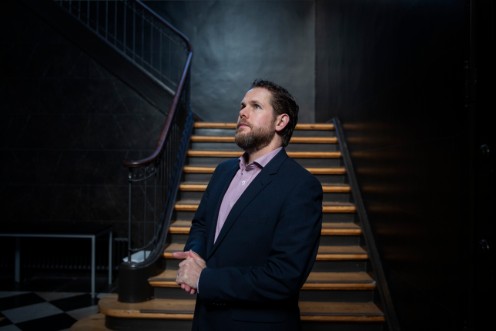Star communicator: "A Facebook thread spawned one of my best research articles"
Somewhat unconventionally, the SCIENCE Dissemination Award 2019 goes to a researcher with a sizeable social media footprint. Thousands of LinkedIn and Twitter followers provide Professor Marcel Bogers with access to discussions, people and information that traditional media channels cannot keep up with. The award recipient encourages fellow researchers to consider their digital presence.

Marcel Bogers is a professor of innovation and entrepreneurship who generously shares his research with 9000 (and counting) Twitter followers and an expansive LinkedIn network. His impact has lead him to the top of the chart on a list of notable researchers on Twitter and LinkedIn in Copenhagen.
As such, Professor Bogers, of the University of Copenhagen’s Department of Food and Resource Economics has been presented with this year's SCIENCE Dissemination Award.
"I am extremely honoured to receive the Dissemination Award. I’ve always worked with social media because it is useful and interesting, and because I consider the communication of my research with the broader community as part of my job," states Professor Bogers.
Marcel Bogers uses various social media channels, not only to promote his own research, projects and PhD students, but to share the work and studies of other researchers. The 38-year-old Dutchman’s participation in online research communities leaves him with the clear conviction that social media adds a very different dimension to his research, one that would not be possible through other channels.
Indeed, a Facebook thread kicked off one of Marcel Boger's most significant research articles.
"One of my best research articles began on Facebook through a discussion about a conference with a researcher who I had not previously worked with. It started as we half-jokingly suggested combining our research interests, and ended up as a collaborative research article that is one of the best that I have ever produced. I don't know if that collaboration would have ever materialized otherwise," says Professor Bogers.
Be present - digitally and in person
According to Bogers, every researcher should at very least create a profile on one or more of the major social media outlets, so that they can be tracked down by other researchers and collaborative partners.
"It's important to consider one’s digital presence, or the lack thereof. Today, people find one another through the digital world. At the same time, it is a showcase for one's research and a means to receive input from so many different people around the world," concludes Professor Bogers.
Three social media tips for researchers from Marcel Bogers
- At very least, have LinkedIn and Twitter profiles that ensure a passive presence – which allows people to find and "tag" you,
- Find a platform that is right for you. For example, Twitter isn't suitable for long discussions
- If you're new to social media, simply begin by updating your profile, create short updates or engage via hashtags and in discussions
Follow Macel Bogers on Twitter http://www.twitter.com/bogers and LinkedIn https://www.linkedin.com/in/bogers.
Related News
Contact
Marcel Bogers
Professor
Department of Food and Resource Economics
marcel@ifro.ku.dk
Tel. +35 33 10 65
Michael Skov Jensen
Press officer
+ 45 93 56 58 97
msj@science.ku.dk
Facts
The Faculty of Science presents the annual SCIENCE Dissemination Award to members of the faculty staff who have made extraordinary efforts in the field of communication.
Marcel Bogers will receive the SCIENCE Dissemination Award 2019 at a reception 4th of december 2019, at 9-12 am in Building A, Rolighedsvej 25, 1958 Frederiksberg C. The award carries a DKK 25,000 purse.
Marcel Bogers is a professor of innovation and entrepreneurship at the University of Copenhagen’s Department of Food and Resource Economics. Among other things, his research addresses the design, organization and management of technology, innovation and entrepreneurship. At the time of writing, Professor Bogers has 9000 Twitter followers and a LinkedIn network of 3526.
